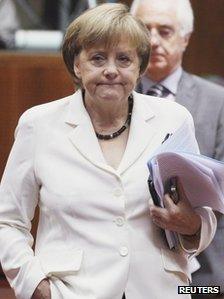Euro: Merkel gives concessions to Italy and Spain
- Published
- comments

Mrs Merkel faced huge pressure to ease eurozone lending rules
Chancellor Angela Merkel has been called Frau Nein - an unbending leader of Germany, unwilling to risk her taxpayers' money in defence of the euro.
In a long Brussels night, she made significant concessions.
The Italians and Spanish - with French backing - forced her into a corner. They warned her that they could no longer continue with the high borrowing costs they were facing.
The Spanish Prime Minister, Mariano Rajoy, spoke of Spanish institutions that could not raise finance. The two countries were not prepared to leave Brussels without measures to reduce their borrowing costs. They threatened to delay agreement on a pact for growth.
The first concession was to allow the eurozone's main bailout fund to help banks directly, external. The money will no longer have to go via a national government, as the current rules dictate.
This policy has proved hugely damaging. When 100bn euros (£81bn; $126bn) was made available for Spanish banks, it forced up the debts of the Spanish government. Europe's leaders were determined to break the cycle of weak banks undermining governments.
However, only last week in Rome the German chancellor had been quite clear - she could never agree to money going to banks directly, because she could not be certain she would get her money back. Last night her objections melted away.
It was also agreed that the European Stability Mechanism (the zone's permanent bailout fund that will start operating in July) could buy government bonds and drive down a country's borrowing costs.
'Game-changer'
There has been a significant easing of the terms of such help.
In future, any country that seeks aid whilst trying to follow the EU's budget rules will not have to accept stringent austerity measures like in the case of Greece. There will be no troika overseeing the economy.
A memorandum of understanding will have to be signed, but conditions will not be as harsh as in the past.
Italian Prime Minister Mario Monti says he won't be applying for a bailout under these conditions. We shall see.
What this means, of course, is that the eurozone's bailout fund (backed by taxpayers' money) will be taking a stake in failed banks.
Risk has been increased. German taxpayers have increased their liabilities. In future a bank crash will no longer fall on the shoulders of national treasuries but on the European Stability Mechanism (ESM), a fund to which Germany contributes the most.
What Mrs Merkel will say is that it is a compromise. She has got a single bank supervisor for all eurozone banks, a major step towards a banking union. This will greatly increase the power of the European Central Bank. Chancellor Merkel sees this as an important lever of control over the zone's banks, and she will argue that gives her room to manoeuvre.
In the short term, these measures will ease pressure in the markets. However there is currently only 500bn euros assigned to the ESM. That may get swallowed up quickly and the markets may demand more. It is still unclear just how deep the holes in the eurozone's banks are.
Other countries will immediately seek to take advantage of these terms, particularly those already in a bailout programme.
Ireland described the deal as a "major game-changer". Its prime minister said it would reduce Ireland's debt levels and avoid the need for a second bailout. Greece, too, will be encouraged to seek major concessions in the terms of its bailout.
The eurozone has committed itself to embark on a road towards "genuine" monetary and economic union., external
The direction of travel is political union. It may take time, but the countries are committed to a chunk of sovereignty moving to Brussels. The aim, as the European Council President Herman Van Rompuy said, was "to make the euro an irreversible project".
Time has been bought. The agreements reached here in Brussels exceeded expectations.
In the short term, pressure on Spain and Italy will be reduced. The pain in the real economy will continue, however.
Both countries are in recession with unemployment rising. The gap between their economies and Germany is only widening. Both countries claim to have made substantial reforms. They haven't. They have made pledges.
The fundamental problem with the eurozone - that it yoked together such different economies - has not gone away.